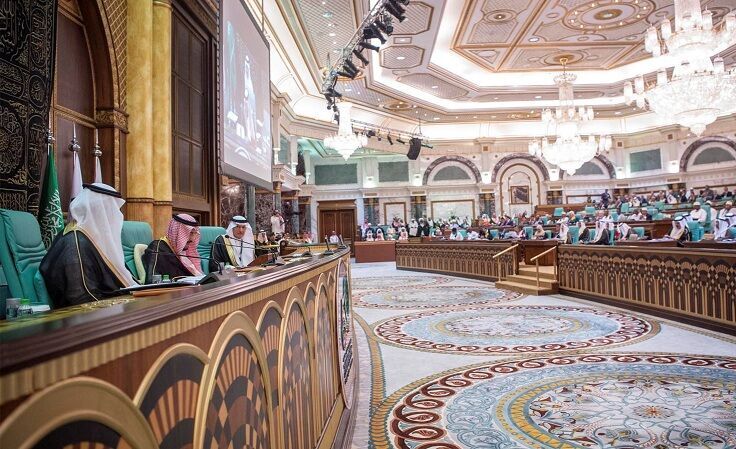Tehran, June 3, IRNA – The final statement of the diplomatic gathering called the Mecca Summit shows the projection of some Arab governments regarding instability in the Middle East while Riyadh's directing the show to undermine the region's realities and deception about the underlying cause of insecurity has sparked Arab states’ protest.
In the middle of the week, the city of Mecca hosted a group of Arab and Islamic governments that had traveled to Saudi Arabia to attend the Organization of Islamic Cooperation, but were also the guests of two other emergency meetings: the Persian Gulf Cooperation Council (PGCC) and the Arab League.
Although these meetings were held to justify the confrontation with sources of instability in the region, their final statements; however, showed that the organizers did not pursue any other goal except to approve Riyadh's claims and showing Iran as threats.
The cases mentioned in the final statements of the two extraordinary meetings of Mecca, show the objectives of its organizers well. What has been mentioned in these statements has been heard in the past days and weeks in various ways and repeatedly from the leaders of Saudi Arabia.
For example, the final statement of the Arab League Summit contains 10 clauses, all of which somehow condemn the regional role and foreign policy of the Islamic Republic of Iran, as if in the opinion of Saudi Arabia, the Middle East has no other "problem" other than Iran.
This statement cites what it calls "Iran's interference in the internal affairs of the countries of the region," "the firing of Iran's long-range missiles on Saudi Arabia," "supporting the Houthi rebels," "intervention in Bahrain's internal affairs," "interference in Syria," and condemns the Islamic Republic of Iran. Finally, it called for the Arab states to cooperate and synergy in countering "Iran's interference in the internal affairs of countries and restoring stability to the region."
There are similarities in the Persian Gulf Cooperation Council's final statement. The fourth clauses of the PGCC statement are dedicated to Iran. In this context, Iran has been called upon to respect the international obligations of good neighborliness relations and not risk the security of the region and the free flow of oil.
These statements not only did not mention the major factors of destabilization, such as the occupation by the Zionist regime, the invasion of Yemen, intervention in Syria, the support of the West and its allies from terrorist groups and extremists, US interventions in the region, and so on. It also announced its support for the US policy in the region.
The Mecca summit ended, while analysts referred to Saudi efforts to impose its views on other countries present at the meeting. According to reports, the Saudi leaders tried to impose their views on the final statement.Iraqi President Barham Salih protested against the move by Riyadh in an explicit mentioning of the name of the Islamic Republic of Iran and accusing Iran of protecting terrorism in the final statement of the Arab League's summit. The move by Saudi Arabia indicated Riyadh's specific anti-Iran goals and motives at the meetings.
The president of Iraq stressed that the existing tensions with Iran could lead to regional and international war if not properly managed. He also expressed hope that Iran's security would not be questioned by other countries.
According to news sources, the Iraqi president, protesting in the shadow of other countries' silence, revealed that Saudi Arabia had not coordinated with Iraq in writing the final statement, and the country did not have any share in the statement.
Similarly, the heads or representatives of other countries, in contrast to Saudi Arabia's views, did not explicitly mention Iran in their speeches.
Salih's remarks and the actions by some Arab and Islamic leaders in mentioning Iran's name are indicative of their awareness of the realities of the region; the fact that observers have long warned President Donald Trump and his allies about it. Saudi Arabia has become a seditious activist in recent tensions between Iran and the United States, although this role has history by the leaders of Riyadh.
A short time ago, Arab media outlets referred to Saudi leaders’ agreement with the US to strengthen military presence in the region for a line-up against Tehran. The activism of the Saudi leadership led Trump after deciding to deploy the aircraft warships, patriot missile system and 52 bombers, to agree with selling arms to Saudi Arabia (worth $ 8 billion) via bypassing the Congress.
In such a space, many observers warn the leaders of Washington about the dangerous act of Saudi Arabia to push the United States to war with Iran.
Holding the Persian Gulf Cooperation Council (PGCC) and the Arab League summits and the attempt to show the unity of Arab and Islamic countries against Iran can also be analyzed in this context. Riyadh makes any effort to display a united regional front against Iran.
Meanwhile, observers say Saudi red carpet and Riyadh regional allies of the US for military intervention and militarism in the region as well as playing a leading role in the arms race, are among the most important factors of the instability of recent decades in the Middle East.
Saudi Arabia's attempt to mobilize the opinions of the neighboring and Arab countries is an endless process that the United States and the Zionist regime are following against the Islamic Republic. On the same token, Iranian president, on Friday, called on the leaders of the Islamic countries to take advantage of the summits to deal with the dangerous conspiracy of “The Deal of The Century” and the defense of Palestine.
But it seems that the Saudi leaders have been at loggerheads to pursue the hostility and the pugnacity against the Islamic Republic of Iran instead of confronting the main sources of insecurity in the region, such as the Zionist regime.


No comments:
Post a Comment